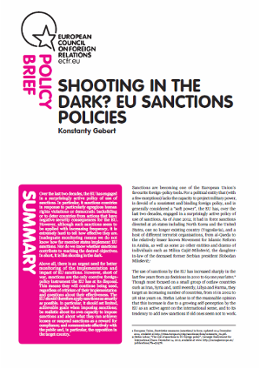Shooting in the dark? EU sanctions policies
Do EU sanctions work?
Short of war, sanctions are the only coercive foreign policy tool available to the EU. But it is incredibly hard to work out whether they are effective – as a tool their use is like shooting in the dark.
Over the last twenty years the EU has used sanctions against 26 states, from North Korea to the US, along with a host of terrorist organisations and dozens of individuals. They have mainly been used in response to human rights violations, democratic backsliding, or to deter actions with negative security consequences for the EU.
The author of a new ECFR Policy Brief – “Shooting in the dark? EU sanctions policies” – Konstanty Gebert, argues that we need much better monitoring of the implementation and impact of sanctions.
- The EU should be realistic, setting limited and achievable goals for sanctions.
- It should loosen or suspend sanctions as a reward for compliance.
- It should communicate with the public and the opposition in the target country.
In the policy brief, Konstanty Gebert looks at the use of “democracy sanctions” against Burma and Belarus, and “security sanctions” against Libya. He finds uneven implementation of sanctions and little awareness of where they are having any impact.
“Using sanctions is like shooting in the dark: we need to know that our bullets are being fired in the right direction if sanctions are to be an effective foreign policy tool. The fact that no systemic mechanism for measuring effectiveness exists seems to be a case of wilful blindness on the part of European institutions.” – Konstanty Gebert
The European Council on Foreign Relations does not take collective positions. ECFR publications only represent the views of their individual authors.



